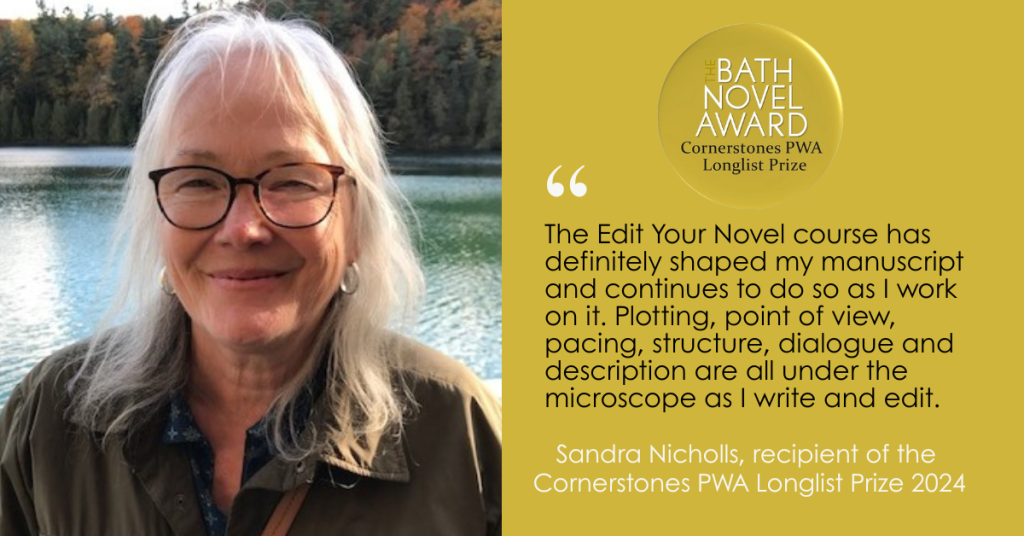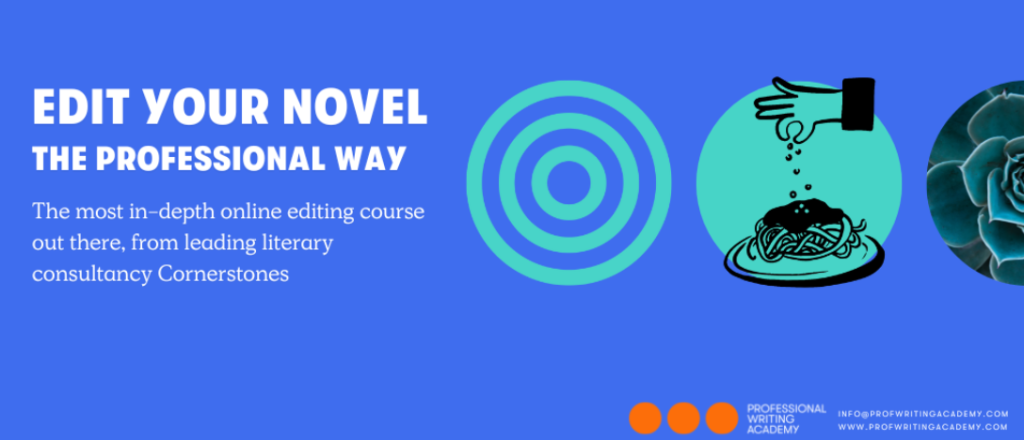Interview: BNA Longlist Prize Recipient Sandra Nicholls
Canadian author Sandra Nicholls is a recent recipient of the Cornerstones PWA Longlist Prize, winning a fully funded place on the course Edit Your Novel the Professional Way. Having now completed the course, Sandra reflects on the journey, from winning the prize to what she learned about editing her novel the professional way.
How did it feel to win the longlist prize and did it change how you see yourself as a writer?
I was gobsmacked to make the longlist with the first 5000 words. I remember waking up early, about 5:30 in the morning, rain pouring outside, and as I gloomily picked up the phone to check for messages, I saw “congratulations” in the subject line!
I was overjoyed to win the prize, the first Canadian to do so! Knowing it was one of 21 novel openings selected by readers from over 2,500 entries from all over the world assured me that there was an audience for the novel. It’s very easy to doubt yourself in the difficult publishing world writers are facing today. There seems to be very little wiggle room, and agents and publishers must be certain that the books will sell. The field is crowded with great writers, great stories. Which is wonderful, of course, but it can also make the prospects for publication rather slim.
By winning the longlist prize, I felt reassured. I was a writer. There were readers. There was a chance. I will be forever grateful to Caroline Ambrose and the Bath contest itself for encouraging little-known authors this way and giving them the confidence to move forward.
Your prize was a place on Edit Your Novel the Professional Way. What were your first impressions of the course?
At first, it all appeared a bit daunting, requiring the commitment of about ten hours a week over 18 weeks. While there is always lots to learn, I wasn’t sure there would be 18 weeks worth! But the Cornerstones course was the perfect next step for me, with practical exercises, a wide reading list for analysis, and the chance to work directly with other emerging writers while learning.
What’s The Hermit about?
When lonely Clara Weatherby hires a hermit to live in her dead husband’s shed, she finds herself drawn into an unexpected friendship, one that will change both of their lives forever.
What inspired you to write it?
The idea was born from the charred remains of an earlier novel. I had been reading an article about a man who was arrested in Maine for stealing food from cottages, and it turned out he had been living as a hermit for 27 years! While this was fascinating enough by itself, the article also included a reference to aristocrats in Georgian England, who would hire hermits to wander their estates.
At first, I thought I might enjoy writing a novel from the point of view of one of these hermits, but I had just finished working for five years on a novel set during the Communist uprising in Malaya in 1948 and was not keen on doing another five years of historical research. I found myself wondering… what if someone did that today? And so the character of Clara Weatherby was born, as she sets in motion an unusual solution to loneliness.
How long have you been working on The Hermit?
I have been working on and off on this novel for several years. It has assumed many different shapes!
How did the course change the way you see your writing?
I think it taught me to take my writing, and thus myself as a writer, seriously. Not that I didn’t before, but to really grapple with some of the challenging exercises gave the whole business of getting a novel right a definite weight and heft.
Were there any particular lightbulb moments or breakthroughs during the course?
There were a number, but two stand out above the rest. One of them occurred during the character module. I realized, by completing the exercises and also getting feedback from the five other writers on the course, that I had shortchanged one of the major characters… Gordon himself, the “hermit”. I began working on his backstory and got to know him much better. It changed everything.
The other breakthrough was during the module on overwriting. One of the exercises required you to deliberately “overwrite” a scene, and then to pare it back. As a fairly minimalist writer, the process of overwriting a scene was great fun, but I also learned a great deal about adding to a scene and not being afraid to take some stylistic chances. I ended up leaving a lot of the “overwriting” in, and it worked.
What was the most rewarding aspect of the course?
Finding a small and supportive group of fellow writers. Since the course required that you analyse the work of the other writers on the course, as well as your own, I read material I wouldn’t normally read, such as speculative fiction, and this was not only a great learning opportunity, but a mind-expanding process. And even though we were only required to read and comment on the work of two other writers with each exercise, we all found ourselves reading everyone’s work, for the sheer pleasure of it. We were only six, so it was possible to do this. Not only did this sharpen our editing skills, by applying them outside our own work, but we got to know each other on a deep level. I was blown away by the calibre of these writers, and we continue to stay in touch, through Zoom and the group forum, as both friends and respected colleagues.
How has the course shaped your manuscript and your confidence as a writer?
The course has definitely shaped my manuscript and continues to do so as I work on it. Plotting, point of view, pacing, structure, dialogue and description are all under the microscope as I write and edit. I find myself consistently going back over my notes and the exercises, as well as the excellent reference book used in the course, On Editing, by Helen Corner-Bryant and Kathryn Price, our brilliant mentors and teachers.
What’s the hardest part of editing a novel, in your experience — and how do you get through it?
I think the hardest, and quite likely the most important part, is trying to see your book from the reader’s point of view. Sometimes, as a writer, you sort of fall in love with an idea or a turn of phrase or a plot element, and you don’t realize how a reader would see it. This can make you blind to weaknesses in the plot, stylistic excesses, or areas where the reader just wouldn’t buy what is happening. But to put yourself on the other side of the chair isn’t easy. How to get through it? I guess you just keep asking yourself the question: how would the reader see this? This was definitely one of the most significant things I learned through the Cornerstones course.
What advice would you give other emerging writers at the editing stage?
I think I would advise them to put the manuscript away for six months. When you’re in the thick of it, sometimes it’s hard to see what needs work. But after a break, there is often a clarity that comes from separating yourself for a while from thinking about it. I find that fresh ideas pop out, new ways of dealing with old problems.
What’s one thing you’ve learned about the craft of writing that you wish you’d known earlier?
I used to think that working out a plot or a structure in advance would take away from the creative spontaneity of just writing with the flow and seeing what happens next. However, what I have learned is that flying blind can lead to hundreds of hours of wasted time and wasted pages, whereas knowing the basic plot ahead of time (with some room for change, of course) can actually liberate creativity by allowing you to focus on the writing itself. This is possibly the single most vital thing I have learned through this course, and I wish I had known it much earlier. I would have saved myself a lot of time and energy.
Now that the course is complete, what’s next for you and your writing?
In addition to work on The Hermit, with thanks and appreciation to the Canada Council of Canada for their support, I am also working on a second novel, Season of Crows, about intergenerational trauma, and a woman whose determination to be a better mother than her own, leads to paranoia and a psychotic break. And I have not given up on The Third Road, the novel set in 1948 colonial Malaya, about a precarious relationship between a young Chinese Communist girl and a British woman who arrives there to join her husband, unaware of the dangers she faces.
SANDRA NICHOLLS lives in Ottawa with her husband and won the Cornerstones PWA Longlist Prize 2024 for The Hermit. She received a fully funded place on the virtual course Edit your Novel the Professional Way with Cornerstones Literary Consultancy and the Professional Writing Academy, which she completed in 2025. Her prose and poetry have also been recognised by the KM Hunter Award; Archibald Lampman Award and the Pat Lowther Award.



